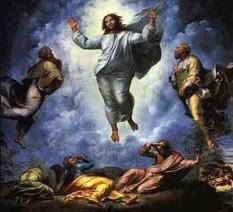 We are accustomed to hear the account of Christ's transfiguration without the surrounding context. The full story can be found in Mt.16:21-17:21, Mk.8:31-9:29, and Lk.9:22-43, with all three synoptic Gospels giving the same contextual details:
We are accustomed to hear the account of Christ's transfiguration without the surrounding context. The full story can be found in Mt.16:21-17:21, Mk.8:31-9:29, and Lk.9:22-43, with all three synoptic Gospels giving the same contextual details:
Jesus tells his disciples that he must go to Jerusalem to die and then to rise again. Then he tells them that every disciple of his must also deny himself, take up his cross and lose his life. Then he says that some of them would not die until the Kingdom of God had come. Then he takes Peter, James, and John with him up Mount Tabor, and appears in great glory with Moses and Elijah. The three disciples are dazzled, Peter wants to erect booths (tents? tabernacles?) for the three glorious figures, a cloud overshadows them, and they hear God say "This is my beloved Son; listen to him.". After that, Jesus alone is to be seen, back to his normal state. On the way back down, Jesus orders the three disciples not to talk about this event until he has died and risen. Once down from the mountain, Jesus casts out a demon which the other disciples had tried to expel but couldn't.
It seems significant that the surrounding details are consistent in all three accounts. It would seem that the transfiguration, that foretaste of resurrected and heavenly glory, is inextricably tied to self-denial and to the cross. This is true not only for Jesus, but for us as well. The flip side is that, in the midst of our crosses and of our desert times, we can take heart and derive strength from the promise of victorious resurrection life. The cross and the resurrection are two sides of a single redemption coin. Our battle against sin and against Satan will be futile outside of this reality.





2 comments:
I think it is interesting that Christ does not deny God but meets with him at the highest point. Christ only seeks out power through God. He only seeks fame in God. He is in complete humility except on this one point - centered around God. And because of this we are all saved.
Ah, yes, the multitudinous pearls of insight which may be gained from the single event of the Transfiguration -- from its obvious manifestation of Christ's resurrection glory and divinity, to its paradoxical connection with the cross, and hence, as you point out, to its call for humility and utter dependence upon God's grace.
Post a Comment